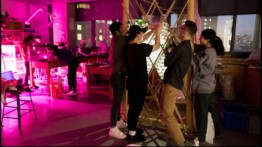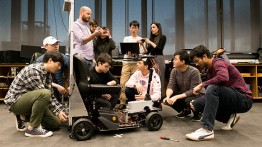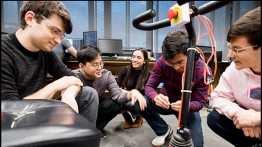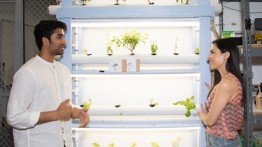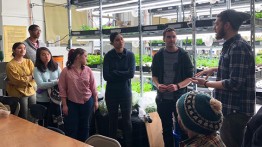State-of-the-Art Interdisciplinary Course Model Comes to Cooper
POSTED ON: April 29, 2020
Starting in Fall 2020, The Cooper Union will join 36 schools around the world offering students a new type of course structure known as Vertically-Integrated Projects (VIP). A concept pioneered by professors at Purdue University, VIP course work allows students to participate in long-term projects with colleagues from other disciplines while working in an environment that lets them apply their theoretical knowledge to real-world problems.
“Students at Cooper have continuously expressed interest in increased collaborative activities and multidisciplinary projects pointing out existing challenges to realize this vision,” says Professor Neveen Shlayan, who has spearheaded the VIP initiative at Cooper.
VIP starts with a group of professors or students who set out to solve a research problem that demands input from a range of disciplines. Generally, these are projects that will take multiple semesters or years to generate sufficient results. Students can work on these research initiatives and earn one credit per semester. They are encouraged to continue to participate for at least three semesters. The goals include giving students the chance to work on long-term projects, learning to work on a team comprised of colleagues from different fields, and creating mentorships with professors.
“Introduction of VIP courses into our curriculum demonstrates our commitment to educational innovation, problem-based learning, and ensuring that Cooper Union is at the leading edge of educational pedagogy,” says Barry Shoop, dean of the Albert Nerken School of Engineering. Should courses need to be taught online in the fall, Professor Shlayan says, many aspects of the VIP classes can succeed even in a virtual format, usually its software and design components.
The first two classes offered in this format will be "Smart Cities," focusing on efforts to make communities more sustainable, and "Solar Decathlon," a course geared towards a federally-sponsored competition that encourages the development of solar-powered technologies. The decathlon class will be using the VIP model to jumpstart a new initiative at Cooper, while the Smart Cities course will provide data on how to integrate existing projects into a VIP format. Professor Shlayan notes, “We have been working for some time to embed the long-term nature of our research projects at the Autonomy Lab into the curriculum. Considering the increasing student interest and the momentum we have gained (we started with three students about two years ago and now we have more than 30 students involved), we thought Smart Cities would be a good platform to pilot the VIP structure.”
Cooper's Autonomy Lab is a multidisciplinary center founded in 2018. Designed to encourage collaboration among the fields of engineering, architecture, art, and the humanities, the lab’s goal is to develop integrated, sustainable solutions for cities to make them more economically, environmentally, and socially resilient. The Smart Cities course comes directly out of multi-faceted research done in the lab by a number of professors and students over the last several years. Subjects have included the designing of autonomous and connected systems, sustainable transportation, and urban agriculture.
The class is an extension of course work underway in a class Professor Shlayan is teaching this spring, as well as research she has conducted with other Cooper professors including Mili Shah, associate professor of mathematics, Dirk Luchtenburg, assistant professor of mechanical engineering, and Austin Wade Smith, instructor of architecture. Furthermore, Shlayan and Professor Smith taught a joint engineering-architecture section of EID 101 in Fall 2019 based on the Cooper Union Sustainable Agriculture Project (CUSAP), a student initiative headed by Dhvanil Shah, an electrical engineering student, and Jessica Martinez of the School of Art. “My experience, jointly offering a course with architecture, was invaluable," Shlayan says. "The feedback we received from students who took this class confirmed that there is a pressing need to create curricular opportunities for faculty to jointly create interdisciplinary content and for students to get involved and continue working alongside architects, artists, and engineers. Some of the projects that were developed in this course are still ongoing and are going to be part of the Smart Cities VIP.” A CUSAP VIP course is also under consideration, she said.
Cosmas Tzavelis professor of civil engineering, will co-teach the "Solar Decathlon" course with Lorena del Rio, assistant professor of architecture, and professors of mechanical engineering Melody Baglione and David Wootton. He points out that ideally a course structured according to the VIP model should include students from different disciplines as well as those at different points in their college careers, from freshmen to seniors. “Especially in the Solar Decathlon VIP, the competition requires the participation of engineering, art, and architecture students,” he says. According to research about vertically-integrated course work, it’s that variety of experience and perspectives that drives innovation.
Although most faculty and students agree that multidisciplinary courses offer many advantages, students at Cooper rarely have time in their schedules to explore classes in other schools. A big plus of VIP is that students earn credit, usually one per semester, and are expected to stick with a project beyond the usual one semester. “When the students work on the same project for more than one semester, they tend to form a bond that may last a lifetime as they learn from each other,” notes Professor Tzavelis, who has observed just such interactions among the members of Cooper’s Steel Bridge Team, which he advises. And equally important, he finds that employers increasingly value job candidates with experience working on multidisciplinary teams.
Electrical engineering sophomore, Alexa Jacob, registered for the "Smart Cities" course because she wants to be part of a long-term research project. “I think this is a great development for research at Cooper,” she says, “because we now have the time (and class credit!) to tackle hard interdisciplinary problems and continuously build on our knowledge.”
Learn more.

